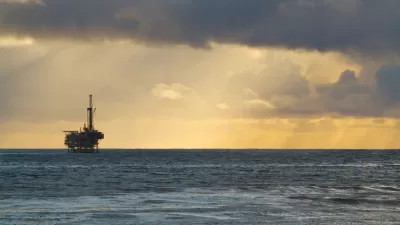Prime Minister Justin Trudeau is treading a fine line between supporting the economy of oil-sands dependent western Canada and fighting climate change, as impossible as that might sound. His efforts were rewarded by the energy industry.
Prime Minister Justin Trudeau was the keynote speaker at last week's CERAWeek energy conference in Houston, Texas, billed as "the premier annual international gathering of energy industry leaders, experts, government officials and policymakers, leaders from the technology, financial, and industrial communities."
Trudeau received "the CERAWeek Global Energy and Environment Leadership Award for his efforts to balance the economy with the environment in his government's policy prescriptions," reports Peter Zimonjic for CBC News.
At the end of the speech Trudeau received a standing ovation from the 1,200 people in the packed room, several of whom commented to CBC News that such a warm reception for a keynote speaker was out of the ordinary for the event.
The excerpt from his speech, widely highlighted by the media, may not have been received as well by his more progressive constituents in Canada as well as by environmentalists in other countries.
"No country would find 173 billion barrels of oil and just leave it in the ground," he said. "The resource will be developed. Our job is to ensure this is done responsibly, safely and sustainably."
Canada has the third largest proven reserves of oil after Venezuela and Saudi Arabia, however, most are in the form of oil sands, aka tar sands, widely considered the dirtiest form of oil, as they produce more greenhouse gas emissions than conventional oil when evaluated using a "full-fuel cycle" analysis. If any form of oil is meant to be "kept in the ground" to fight climate change, it would be oil sands, according to many in the environmental community.
Referencing a 1980s energy policy developed by his late father, Prime Minister Pierre Trudeau, and his predecessor, Stephen Harper, the 45-year-old leader of the Liberal Party said the "National Energy Program hurt both growth and jobs while the Conservatives failed to understand that the economy and climate change are linked," adds Zimonjic.
Touting his government's approval of new pipelines, and the Liberal's national plan to put a price on carbon, which were achieved at the same time, Trudeau said his government had achieved some good first steps at growing the economy and protecting the environment — but that more work still needs to be done.
Similarly, President Donald Trump has also approved controversial pipelines, but unlike Trudeau, both he and his environmental administrator question climate change. Rather than showing a willingness to improve the environment, Trump's commitment is to remove what he regards as burdensome regulations on industry.
FULL STORY: Trudeau says he will succeed on energy where his father and Stephen Harper failed

Alabama: Trump Terminates Settlements for Black Communities Harmed By Raw Sewage
Trump deemed the landmark civil rights agreement “illegal DEI and environmental justice policy.”

Planetizen Federal Action Tracker
A weekly monitor of how Trump’s orders and actions are impacting planners and planning in America.

The 120 Year Old Tiny Home Villages That Sheltered San Francisco’s Earthquake Refugees
More than a century ago, San Francisco mobilized to house thousands of residents displaced by the 1906 earthquake. Could their strategy offer a model for the present?

Ken Jennings Launches Transit Web Series
The Jeopardy champ wants you to ride public transit.

BLM To Rescind Public Lands Rule
The change will downgrade conservation, once again putting federal land at risk for mining and other extractive uses.

Indy Neighborhood Group Builds Temporary Multi-Use Path
Community members, aided in part by funding from the city, repurposed a vehicle lane to create a protected bike and pedestrian path for the summer season.
Urban Design for Planners 1: Software Tools
This six-course series explores essential urban design concepts using open source software and equips planners with the tools they need to participate fully in the urban design process.
Planning for Universal Design
Learn the tools for implementing Universal Design in planning regulations.
Clanton & Associates, Inc.
Jessamine County Fiscal Court
Institute for Housing and Urban Development Studies (IHS)
City of Grandview
Harvard GSD Executive Education
Toledo-Lucas County Plan Commissions
Salt Lake City
NYU Wagner Graduate School of Public Service




























